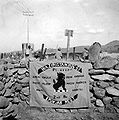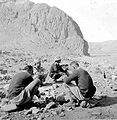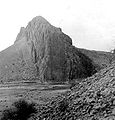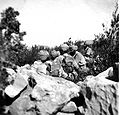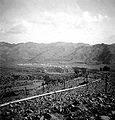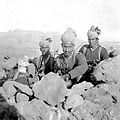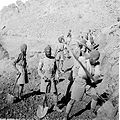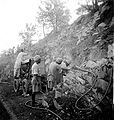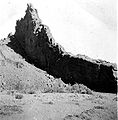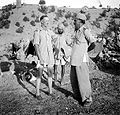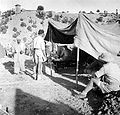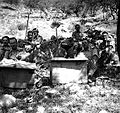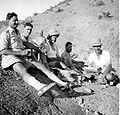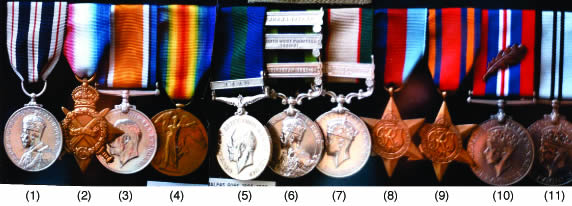Reginald Malpas Gore: Difference between revisions
Symorsebrown (talk | contribs) Add medal table. Temp save |
No edit summary |
||
| (24 intermediate revisions by 3 users not shown) | |||
| Line 1: | Line 1: | ||
[[Image:RM Gore c.1930.jpg|thumb|R M Gore c.1930]] | [[Image:RM Gore c.1930.jpg|thumb|R M Gore c.1930]] | ||
==== ''' | ==== '''The military service of Lt-Col Reginald Malpas Gore (1895-1969)''' ==== | ||
{{Template:Origin|text=The information for this biography and the associated photographs have been contributed by a FIBIS member who is the son of the subject. It describes the military career of a distinguished soldier in the Indian Army and his earlier service in the First World War. The internal and external links are by Fibiwiki editors.}} | {{Template:Origin|text=The information for this biography and the associated photographs have been contributed by a FIBIS member who is the son of the subject. It describes the military career of a distinguished soldier in the Indian Army and his earlier service in the First World War. The internal and external links are by Fibiwiki editors.}} | ||
'''Early Life and World War I'''<br /> | '''Early Life and World War I'''<br /> | ||
Reggie was the youngest of three surviving sons of a Kentish farming family | Reggie was the youngest of three surviving sons of a Kentish farming family. The story of this family is described in [http://books.google.com/books?id=hrpS_YQ9FoAC&lpg=PP1&dq=On%20Kentish%20Chalk&pg=PP1#v=onepage&q&f=false'' "On Kentish Chalk - A Farming Family of the North Downs"'' by David Gore 2006]. His grandfather had emigrated to the Australian goldfields in the 1850s where he made his fortune. This allowed Reggie’s father to go off and train as a doctor back in England where Reggie and his brothers were born and educated. Reggie, aged 19, was visiting his relations in Queensland in 1914 when ‘the Great War’ broke out and he enlisted there in the [http://en.wikipedia.org/wiki/9th_Battalion,_Royal_Queensland_Regiment#World_War_I 9th Infantry, Australian Imperial Force]. A month later he heard that his eldest brother Sydney had been killed in France, and six months later he was himself fighting against the Turks at [http://en.wikipedia.org/wiki/ANZAC_Cove ANZAC Cove], Gallipoli. He was commissioned the following year and transferred to [http://en.wikipedia.org/wiki/25th/49th_Battalion,_Royal_Queensland_Regiment#49th_Battalion.2C_AIF 49th Infantry AIF] with whom he was in the trenches on the [http://en.wikipedia.org/wiki/Western_Front_(World_War_I) Western Front] in France both in 1916 and 1917. | ||
On the conclusion of the war, Reggie transferred to the [[Indian Army]] in which his other brother had been serving. He joined the 1st Battalion, [[88th Carnatic Infantry]] with which he went to Iraq during the [http://en.wikipedia.org/wiki/British_Mandate_of_Mesopotamia British Mesopotamian mandate 1920-22] where his battalion was brought in to quell a combined Shia and Sunni inspired insurrection (shades of Iraq in 2003). There followed a period on operations in [[Waziristan]] with 2nd Battalion, [[90th Punjab Regiment|90th Punjabis]], after which in 1922 he became adjutant when the 90th was renamed 2nd Battalion, [http://en.wikipedia.org/wiki/8th_Punjab_Regiment 8th Punjab Regiment] and moved to [[Bannu]]. | On the conclusion of the war, Reggie transferred to the [[Indian Army]] in which his other brother had been serving. He joined the 1st Battalion, [[88th Carnatic Infantry]] with which he went to Iraq during the [http://en.wikipedia.org/wiki/British_Mandate_of_Mesopotamia British Mesopotamian mandate 1920-22] where his battalion was brought in to quell a combined Shia and Sunni inspired insurrection (shades of Iraq in 2003). There followed a period on operations in [[Waziristan]] with 2nd Battalion, [[90th Punjab Regiment|90th Punjabis]], after which in 1922 he became adjutant when the 90th was renamed 2nd Battalion, [http://en.wikipedia.org/wiki/8th_Punjab_Regiment 8th Punjab Regiment] and moved to [[Bannu]]. | ||
In 1931 Reggie was seconded to the [http://www.britishempire.co.uk/forces/armyunits/burma/bmp.htm Burma Military Police] in [[Rangoon]] where he helped in the quelling of the rebellions at Tharrawaddy and [[Prome]]. He was then sent north to the [http://en.wikipedia.org/wiki/Shan_State Shan States] based at Loimwe where he had to deal with banditry, mostly from across the Chinese border. He was awarded the [http://en.wikipedia.org/wiki/Queen's_Police_Medal#King.27s_Police_Medal King’s Police Medal] for three operations which he led against armed bandits in 1934. [http://books.google.com/books?id=hrpS_YQ9FoAC&lpg=PP1&dq=On%20Kentish%20Chalk&pg=PA91#v=onepage&q&f=true Read the citation]. | In 1931 Reggie was seconded to the [http://www.britishempire.co.uk/forces/armyunits/burma/bmp.htm Burma Military Police] in [[Rangoon]] where he helped in the quelling of the rebellions at [[Tharrawaddy]] and [[Prome]]. He was then sent north to the [http://en.wikipedia.org/wiki/Shan_State Shan States] based at Loimwe where he had to deal with banditry, mostly from across the Chinese border. He was awarded the [http://en.wikipedia.org/wiki/Queen's_Police_Medal#King.27s_Police_Medal King’s Police Medal] for three operations which he led against armed bandits in 1934. [http://books.google.com/books?id=hrpS_YQ9FoAC&lpg=PP1&dq=On%20Kentish%20Chalk&pg=PA91#v=onepage&q&f=true Read the citation]. | ||
'''[[Operations in Waziristan]]'''<br /> | '''[[Operations in Waziristan]]'''<br /> | ||
Major Gore rejoined his battalion (2/8th) as a company commander in time for its operations in Waziristan 1936-37. | Major Gore rejoined his battalion (2/8th) as a company commander in time for its operations in Waziristan 1936-37. The most detailed account of this campaign is to be found in ''Official history of operations on the N.W. frontier of India, 1936-37'' ISBN 1 84342 765 6. The photographs below were taken by him on campaign. Click on an image to enlarge it. | ||
<gallery> | |||
Image:Waziristan Btn Warflag.jpg|<center>Battalion war flag at Dosalli</center> | |||
Image:Waziristan Niffs.jpg|<center>Some of my "Niffs"</center> | |||
Image:3 Wazir village 3.jpg|<center>Wazir village during Khanora ops</center> | |||
Image:4 Lunch nr tangi.jpg|<center>Having lunch near the tangi</center> | |||
Image:5 tangi.jpg|<center>Tangi (defile)</center> | |||
Image:6 Btn guard post.jpg|<center>Battalion guard post</center> | |||
Image:7 Patrol.jpg|<center>Patrol</center> | |||
Image:8 Dosalli camp.jpg|<center>Dosalli camp from a picquet position</center> | |||
Image:9 Behind a sangar.jpg|<center>Behind a sangar (stone breastwork)</center> | |||
Image:10 Picquet.jpg|<center>Picquet</center> | |||
Image:11 Burning a village.jpg|<center>Burning a village during Khanora ops</center> | |||
Image:12 British officers.jpg|<center>Stiffs all! (four British officers of the battalion)</center> | |||
Image:13 Road making.jpg|<center>Road making</center> | |||
Image:14 Road making.jpg|<center>Road making</center> | |||
Image:15 Road making.jpg|<center>Road making</center> | |||
Image:16 Obstruction.jpg|<center>The road had to go through this thing!</center> | |||
Image:17 Coronation camp.jpg|<center>Coronation Camp</center> | |||
Image:18 My Niffs.jpg|<center>More of my "Niffs"</center> | |||
Image:19 Gore in camp.jpg|<center>Officer in camp (sunburnt knees!)</center> | |||
Image:20 Camp.jpg|<center>In camp</center> | |||
Image:21 Officers lunch.jpg|<center>British officers having lunch in the shade</center> | |||
Image:22 Btn officers.jpg|<center>Officers of the battalion</center> | |||
</gallery> | |||
''' | '''Officers on Campaign'''<br /> | ||
"Taken at Biche Kashkai during the present ops. Nothing but what we stood up in - not even a cake of soap!<br />15 days out like this, fighting every day and often during the night."<br /> | |||
[[Image:Waziristan 600.jpg|thumb|650px|left|L to R: Henry Stead, Tom Edwards, Jonah, Reggie Gore, John Woodhouse]] | |||
'''World War II''' | |||
After an attachment to the 10/8th, Gore was promoted Lt Col on the outbreak of World War II. He took part with [http://en.wikipedia.org/wiki/14th_Indian_Infantry_Division#First_Arakan_Campaign 14th Indian Division] in the first counter offensive into Burma southward from Cox’s Bazaar along the Mayu peninsula in the [http://en.wikipedia.org/wiki/Rakhine_State Arakan]. It was an ill-fated operation mounted in December 1942 against well-prepared Japanese positions on the most difficult terrain. The Arakan has steep jungle-covered hills rising to 1500 feet, two major rivers, an almost impassable mountain barrier on the eastern side, an unhealthy climate and monsoon rains which make manoeuvring impossible for six months of the year. It was in February after two months fighting, severe losses and failure to break through at Donbaik that Reggie himself was evacuated suffering from amoebic hepatitis. | After an attachment to the 10/8th, Gore was promoted Lt Col on the outbreak of World War II. He took part with [http://en.wikipedia.org/wiki/14th_Indian_Infantry_Division#First_Arakan_Campaign 14th Indian Division] in the first counter offensive into Burma southward from Cox’s Bazaar along the Mayu peninsula in the [http://en.wikipedia.org/wiki/Rakhine_State Arakan]. It was an ill-fated operation mounted in December 1942 against well-prepared Japanese positions on the most difficult terrain. The Arakan has steep jungle-covered hills rising to 1500 feet, two major rivers, an almost impassable mountain barrier on the eastern side, an unhealthy climate and monsoon rains which make manoeuvring impossible for six months of the year. It was in February after two months fighting, severe losses and failure to break through at Donbaik that Reggie himself was evacuated suffering from amoebic hepatitis. | ||
He was passed fit again in August 1943 when he became CO of the [http://www.ordersofbattle.com/UnitData.aspx?UniX=172136&Tab=Uhi&Titl=16/8%20Punjab%20Regiment 16th Battalion] taking part in the final phase of the Burma campaign as part of the [http://en.wikipedia.org/wiki/109th_Indian_Infantry_Brigade 109th Indian Infantry brigade]. By June 1945 the battalion was back at Chhindwara in India and Reggie was posted to the 8th Punjab regimental centre to prepare for the Indian and Pakistani military partition of 1947, after which he retired. The 8th Punjab Regiment was transferred into the Pakistan army where it is now part of its [http://en.wikipedia.org/wiki/Baloch_Regiment#Amalgamation Baloch Regiment]. | He was passed fit again in August 1943 when he became CO of the [http://www.ordersofbattle.com/UnitData.aspx?UniX=172136&Tab=Uhi&Titl=16/8%20Punjab%20Regiment 16th Battalion] taking part in the final phase of the Burma campaign as part of the [http://en.wikipedia.org/wiki/109th_Indian_Infantry_Brigade 109th Indian Infantry brigade]. By June 1945 the battalion was back at Chhindwara in India and Reggie was posted to the 8th Punjab regimental centre to prepare for the Indian and Pakistani military partition of 1947, after which he retired. The 8th Punjab Regiment was transferred into the Pakistan army where it is now part of its [http://en.wikipedia.org/wiki/Baloch_Regiment#Amalgamation Baloch Regiment]. | ||
''' | |||
[[Image:Gore-Medals.jpg| | |||
'''Colonel Gore's medals'''<br /> | |||
[[Image:Gore-Medals.jpg|650px|Col Gore's medals]] | |||
<div style="column-count:2;-moz-column-count:2;-webkit-column-count:2"> | <div style="column-count:2;-moz-column-count:2;-webkit-column-count:2"> | ||
(1) | (1) [http://en.wikipedia.org/wiki/Queen's_Police_Medal King's Police Medal for Gallantry]<br /> | ||
(2) | (2) [http://en.wikipedia.org/wiki/1914%E2%80%9315_Star 1914-15 Star]<br /> | ||
(3) | (3) [http://en.wikipedia.org/wiki/British_War_Medal British War Medal 1914-18]<br /> | ||
(4) Allied Victory Medal | (4) [http://en.wikipedia.org/wiki/Victory_Medal_(United_Kingdom) Allied Victory Medal]<br /> | ||
(5) | (5) [http://en.wikipedia.org/wiki/General_Service_Medal_(1918) General Service Medal (1918)]<br /> | ||
(6) India | :Clasp: Iraq | ||
:*Clasp | (6) [http://en.wikipedia.org/wiki/India_General_Service_Medal_(1909) India General Service Medal (1909)]<br /> | ||
:*Clasp | :*Clasp: Waziristan 1921-24 | ||
:*Clasp | :*Clasp: North West Frontier 1930–31 | ||
(7) India General Service Medal | :*Clasp: Burma 1930–32 | ||
(7) [http://en.wikipedia.org/wiki/India_General_Service_Medal_(1936) India General Service Medal (1936)] | |||
:* Clasp: NW Frontier 1936-37 | :* Clasp: NW Frontier 1936-37 | ||
(8) 1939-45 Star<br /> | (8) [http://en.wikipedia.org/wiki/1939–45_Star 1939-45 Star]<br /> | ||
(9) | (9) [http://en.wikipedia.org/wiki/Burma_Star Burma Star]<br /> | ||
(10) War Medal 1939-45 | (10) [http://en.wikipedia.org/wiki/War_Medal_1939–1945 War Medal 1939-45] | ||
:* Oak leaf: mentioned in despatches | :* Oak leaf: [http://en.wikipedia.org/wiki/Mentioned_in_Despatches mentioned in despatches] | ||
(11) India Service Medal 1939-45<br /><br /> | (11) [http://en.wikipedia.org/wiki/India_Service_Medal India Service Medal 1939-45]<br /><br /><br /> | ||
</div> | </div> | ||
[[Category:People|Gore, Reginald Malpas]] | |||
[[Category:Soldier|Gore, Reginald Malpas]] | |||
Latest revision as of 07:38, 9 April 2015
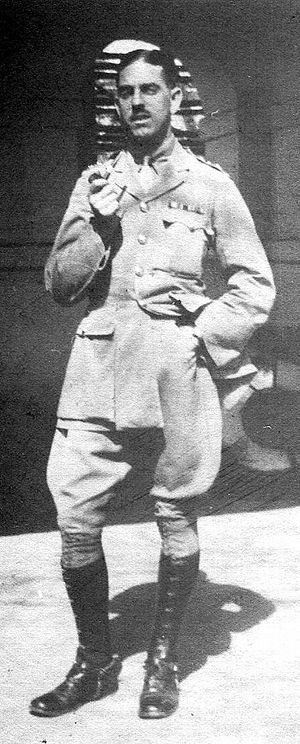
The military service of Lt-Col Reginald Malpas Gore (1895-1969)
| The information for this biography and the associated photographs have been contributed by a FIBIS member who is the son of the subject. It describes the military career of a distinguished soldier in the Indian Army and his earlier service in the First World War. The internal and external links are by Fibiwiki editors. |
Early Life and World War I
Reggie was the youngest of three surviving sons of a Kentish farming family. The story of this family is described in "On Kentish Chalk - A Farming Family of the North Downs" by David Gore 2006. His grandfather had emigrated to the Australian goldfields in the 1850s where he made his fortune. This allowed Reggie’s father to go off and train as a doctor back in England where Reggie and his brothers were born and educated. Reggie, aged 19, was visiting his relations in Queensland in 1914 when ‘the Great War’ broke out and he enlisted there in the 9th Infantry, Australian Imperial Force. A month later he heard that his eldest brother Sydney had been killed in France, and six months later he was himself fighting against the Turks at ANZAC Cove, Gallipoli. He was commissioned the following year and transferred to 49th Infantry AIF with whom he was in the trenches on the Western Front in France both in 1916 and 1917.
On the conclusion of the war, Reggie transferred to the Indian Army in which his other brother had been serving. He joined the 1st Battalion, 88th Carnatic Infantry with which he went to Iraq during the British Mesopotamian mandate 1920-22 where his battalion was brought in to quell a combined Shia and Sunni inspired insurrection (shades of Iraq in 2003). There followed a period on operations in Waziristan with 2nd Battalion, 90th Punjabis, after which in 1922 he became adjutant when the 90th was renamed 2nd Battalion, 8th Punjab Regiment and moved to Bannu.
In 1931 Reggie was seconded to the Burma Military Police in Rangoon where he helped in the quelling of the rebellions at Tharrawaddy and Prome. He was then sent north to the Shan States based at Loimwe where he had to deal with banditry, mostly from across the Chinese border. He was awarded the King’s Police Medal for three operations which he led against armed bandits in 1934. Read the citation.
Operations in Waziristan
Major Gore rejoined his battalion (2/8th) as a company commander in time for its operations in Waziristan 1936-37. The most detailed account of this campaign is to be found in Official history of operations on the N.W. frontier of India, 1936-37 ISBN 1 84342 765 6. The photographs below were taken by him on campaign. Click on an image to enlarge it.
-
Battalion war flag at Dosalli -
Some of my "Niffs" -
Wazir village during Khanora ops -
Having lunch near the tangi -
Tangi (defile) -
Battalion guard post -
Patrol -
Dosalli camp from a picquet position -
Behind a sangar (stone breastwork) -
Picquet -
Burning a village during Khanora ops -
Stiffs all! (four British officers of the battalion) -
Road making -
Road making -
Road making -
The road had to go through this thing! -
Coronation Camp -
More of my "Niffs" -
Officer in camp (sunburnt knees!) -
In camp -
British officers having lunch in the shade -
Officers of the battalion
Officers on Campaign
"Taken at Biche Kashkai during the present ops. Nothing but what we stood up in - not even a cake of soap!
15 days out like this, fighting every day and often during the night."
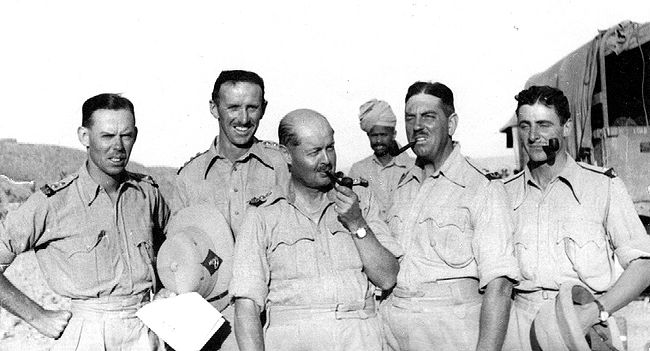
World War II After an attachment to the 10/8th, Gore was promoted Lt Col on the outbreak of World War II. He took part with 14th Indian Division in the first counter offensive into Burma southward from Cox’s Bazaar along the Mayu peninsula in the Arakan. It was an ill-fated operation mounted in December 1942 against well-prepared Japanese positions on the most difficult terrain. The Arakan has steep jungle-covered hills rising to 1500 feet, two major rivers, an almost impassable mountain barrier on the eastern side, an unhealthy climate and monsoon rains which make manoeuvring impossible for six months of the year. It was in February after two months fighting, severe losses and failure to break through at Donbaik that Reggie himself was evacuated suffering from amoebic hepatitis.
He was passed fit again in August 1943 when he became CO of the 16th Battalion taking part in the final phase of the Burma campaign as part of the 109th Indian Infantry brigade. By June 1945 the battalion was back at Chhindwara in India and Reggie was posted to the 8th Punjab regimental centre to prepare for the Indian and Pakistani military partition of 1947, after which he retired. The 8th Punjab Regiment was transferred into the Pakistan army where it is now part of its Baloch Regiment.
Colonel Gore's medals
(1) King's Police Medal for Gallantry
(2) 1914-15 Star
(3) British War Medal 1914-18
(4) Allied Victory Medal
(5) General Service Medal (1918)
- Clasp: Iraq
(6) India General Service Medal (1909)
- Clasp: Waziristan 1921-24
- Clasp: North West Frontier 1930–31
- Clasp: Burma 1930–32
(7) India General Service Medal (1936)
- Clasp: NW Frontier 1936-37
(8) 1939-45 Star
(9) Burma Star
(10) War Medal 1939-45
- Oak leaf: mentioned in despatches
